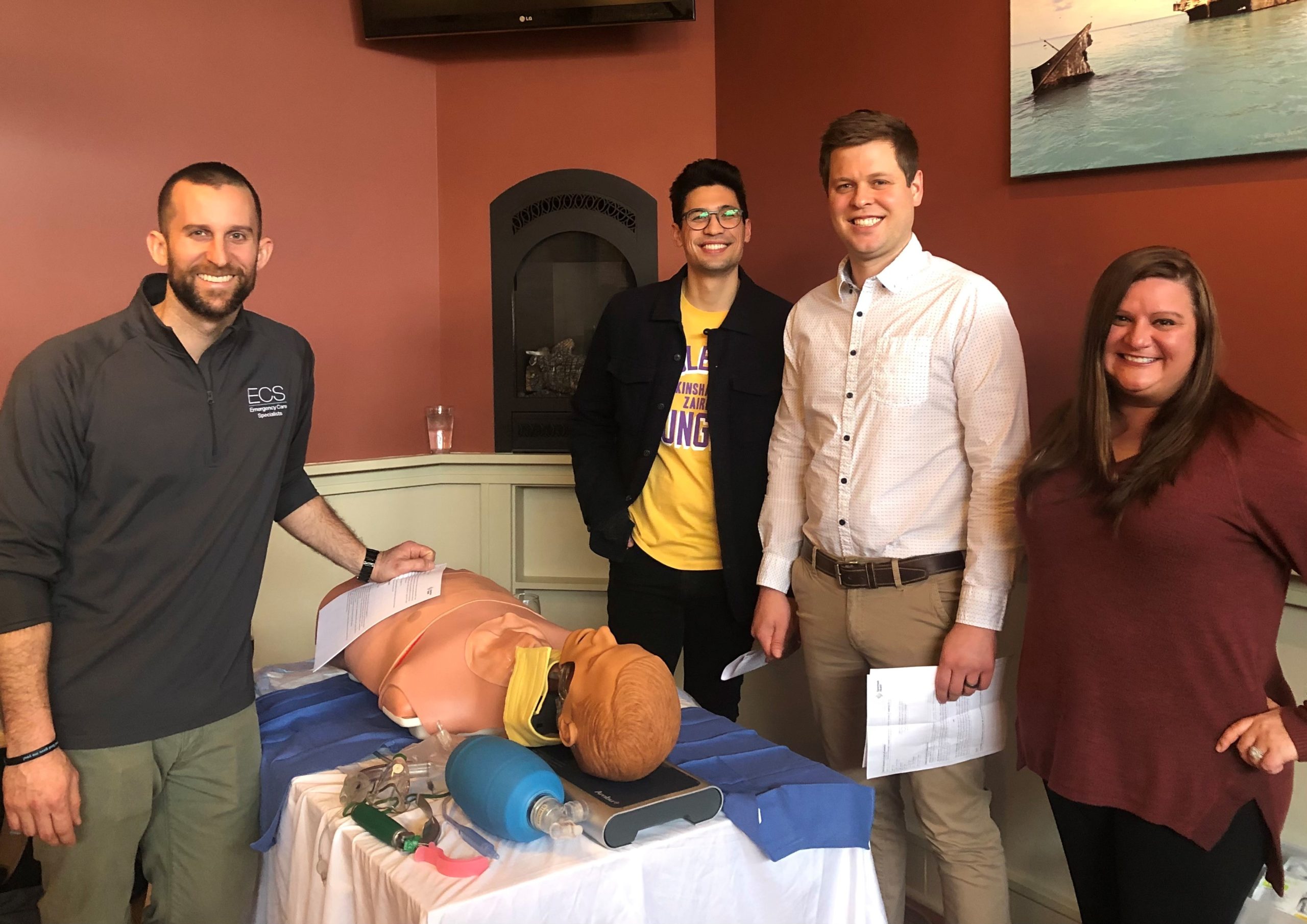Ludington Hospital
Emergency Care Specialists Physician Group Holds Trauma Simulation Training

March 25, 2022
Emergency Care Specialists (ECS), the emergency physician group at Spectrum Health Ludington Hospital and most other Spectrum Health hospitals, recently held a trauma simulation skills lab for all Ludington Hospital clinical team members in the emergency department. The event was designed to help the clinical team gain knowledge about latest technologies and methods for assessing, responding to and treating a variety of trauma situations.
“Being new to Ludington Hospital, we wanted to hold this event both as a learning exercise and as a team building event,” said Corey Fellows, DO, trauma medical director and ECS physician at Spectrum Health Ludington Hospital. “ECS holds several educational sessions throughout the year across other sites as well.”
“At the Ludington event,” Dr. Fellows stated, “we wanted to showcase some of the latest techniques in lifesaving measures. Health care is one of those fields where the learning is continuous as new technologies and new processes are developed. We want our team to always stay at the top of the learning curve. These trauma simulation labs help that process.”
The event was held with different learning stations set up around the room so that team members could go from station to station to do hands-on simulations, look at images, find out about new technologies available and ask questions. One station involved a trauma code with a mannequin. The physicians did a simulation whereby the mannequin needed to be intubated. Team members were able to run through the trauma code as they would if the mannequin were a real patient brought to the emergency department. They were able to work together to safely and quickly get the breathing tube into the mannequin’s airway, just as they would for a real patient, thus saving a life.
Spectrum Health Ludington Hospital is designated as a level IV trauma center. According to Lindsey Mitchell, RN, BSN, trauma coordinator at the hospital, a level IV has demonstrated ability to provide advanced trauma life support prior to the transfer of patients to a higher-designated facility. “Our designation means that we can evaluate, stabilize, and diagnose injured patients,” she said. “A level IV trauma center must be able to implement protocols for advanced trauma life support, must have 24-hour laboratory and diagnostic imaging coverage, trauma nurses and physicians available upon patient arrival, surgical and critical care facilities available, a quality improvement program, be involved with prevention efforts and an active community outreach program, and must have transfer agreements for patients requiring more comprehensive care at a Level I or II trauma center.”
Another of the learning stations involved chest tube insertions, with general surgeon Keith Langlois, MD showcasing new equipment and supplies recently added to the emergency department in Ludington. Chest tube insertions are performed on patients who have collapsed lungs, such as those involved in serious motor vehicle accidents. Both the emergency department physicians and general surgeons are credentialed to perform chest tube insertions. General surgeons or hospitalists are credentialed to remove the chest tubes. While Dr. Langlois showed the process of inserting the chest tube, Ginger Allison, RN, a nurse in the clinical education department, demonstrated the nursing side of the procedure and showed how to maintain the equipment properly.
Other stations included ultrasound-guided IV insertions, abdominal ultrasound FAST exams to show bleeding in abdominal cavities, clinical documentation tips and tricks for trauma patients, Zol defibrillators, arterial line review, assessment of airway trauma using scopes that show bleeding in the esophagus, and the EZ IO IV station for patients who need a long-lasting IV.
“We’re fortunate to have Emergency Care Specialists in Ludington,” said Kevin Franklin, MSN, RN, EMT-P, CFRN, Emergency Department nurse manager at Spectrum Health Ludington Hospital. “They care deeply about the clinical outcomes of our patients and the clinical training and knowledge of our team. Their approach in caring for patients is showing up in our improved patient satisfaction scores as well as the many clinical metrics we track and report.”
People are at the heart of everything we do, and the inspiration for our legacy of outstanding outcomes, innovation, strong community partnerships, philanthropy and transparency. Corewell Health is a not-for-profit health system that provides health care and coverage with an exceptional team of 60,000+ dedicated people—including more than 11,500 physicians and advanced practice providers and more than 15,000 nurses providing care and services in 21 hospitals, 300+ outpatient locations and several post-acute facilities—and Priority Health, a provider-sponsored health plan serving more than 1.3 million members. Through experience and collaboration, we are reimagining a better, more equitable model of health and wellness. For more information, visit corewellhealth.org.
Contact:
Patricia Ezdebski
Marketing and Public Relations
Office: 231.845.2350
Mobile: 231.301.4864
Email: patricia.ezdebski@corewellhealth.org

